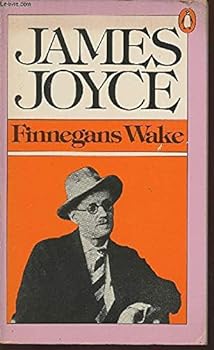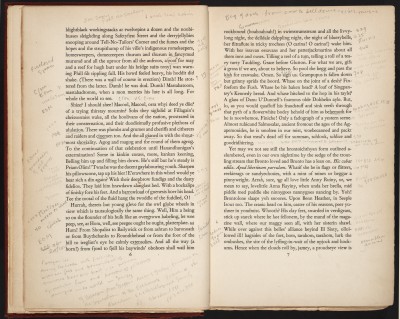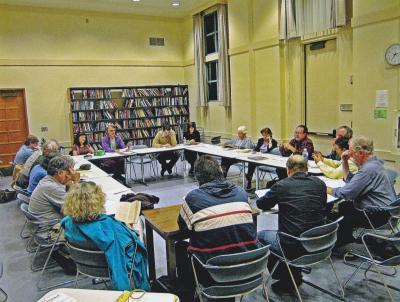This Book Club Finally Finished Reading “Finnegans Wake” After 28 Years
The group, which calls itself the Marshall McLuhan/Finnegans Wake Reading Club, in Venice, California, started the difficult James Joyce book in 1995. They reached its final page during last October. What’s the connection between Marshall McLuhan and James Joyce’s writing? McLuhan was fascinated with the writings of James Joyce at a time that few in North America knew much about Joyce and his few great books. McLuhan was especially intrigued by Finnegans Wake. He wrote: “Nobody could pretend serious interest in my work who is not completely familiar with all of the works of James Joyce and the French symbolists.” – Marshall McLuhan
By Lois Beckett
For a quarter century, Gerry Fialka, an experimental film-maker from Venice, California, has hosted a book club devoted to a single text: James Joyce’s Finnegans Wake, one of the most famously difficult texts in literary history.
Starting in 1995, between 10 and 30 people would show up to monthly meetings at a local library. At first they read two pages a month, eventually slowing to just one page per discussion. At that pace, the group – which now meets on Zoom – reached the final page in October. It took them 28 years.
That amount of time “could well be a record”, said Sam Slote, a Joyce expert at Trinity College, Dublin, and one of the editors of How Joyce Wrote Finnegans Wake. His own weekly Wake group in Dublin, which is made up of about a dozen Joyce scholars, is on track to read through the text in a brisk 15 years.
The California reading group spent longer reading Finnegans Wake than Joyce spent writing it: the 628-page experimental text took the author 17 years to complete, Slote said, including a four-year stretch of near-complete writer’s block.
Fialka, who started the group in his early 40s, is now 70. “I don’t want to lie, it wasn’t like I saw God,” Fialka said, of reaching the book’s end. “It wasn’t a big deal.”
While Joyce’s Ulysses has a reputation as a difficult novel, Slote said, Finnegans Wake is “a whole different level”, with ongoing debate over basic points such as where and when the novel is set, or who the characters are. It is written in a mishmash of reinvented words, puns and allusions, with references to roughly 80 different languages.
“When people hear you’ve been a member of a book club that reads the same book every time you meet, most people go, ‘Why would you do that?’” said Bruce Woodside, a 74-year-old retired Disney animator who joined Fialka’s reading group in the 1990s. Though “it’s 628 pages of things that look like typographic errors”, said Woodside, who has been reading and re-reading Finnegans Wake since his late teens. “There’s a kind of visionary quality to it.”
Fialka leans into that visionary aspect, describing his group as “more a performance art piece than a book club”, and also referring to it as “a living organism”, a “hootenanny”, and a “choir”.
Woodside found the club’s early atmosphere “kind of chaotic”. The first impression of most readers is that Finnegans Wake is “gibberish”, Woodside said, and he recalls that “a lot of commentary on it was gibberish”, too.

Woodside dropped out of Fialka’s group for about two decades, but after he retired, he decided to go back. He had sampled other book groups, including a Proust reading group that had pivoted to reading Finnegans Wake, but it was hard to find anyone “who was really delivering a lot of intelligent commentary on the book”.
“Gerry’s group was just fun,” Woodside said. In the 20 years he had missed, he said, the group had advanced from chapter one to chapter 15.
Peter Quadrino, 38, joined Fialka’s group around 2008 or 2009. He would drive up three hours from San Diego, where he lived, to attend the meeting. “If you’re really interested in Finnegans Wake, it’s kind of hard to find people who will talk about it with you”…
READ THE REST OF THIS ARTICLE HERE: http://tinyurl.com/4zaymney
SEE ALSO: https://people.well.com/user/abs/Cyb/archive/mcluhan_joyce.html

One of Marshal McLuhan’s copies of Finnegans Wake showing his abundant marginalia, now in the Fisher Rare Book Library at the University of Toronto
Filed under: Academic, Articles, Books, Computers, Education, Ideas, Influenced by McLuhan, Literature, Uncategorized | Closed
Tags: academic, articles, books, communication, culture, ideas, literature

